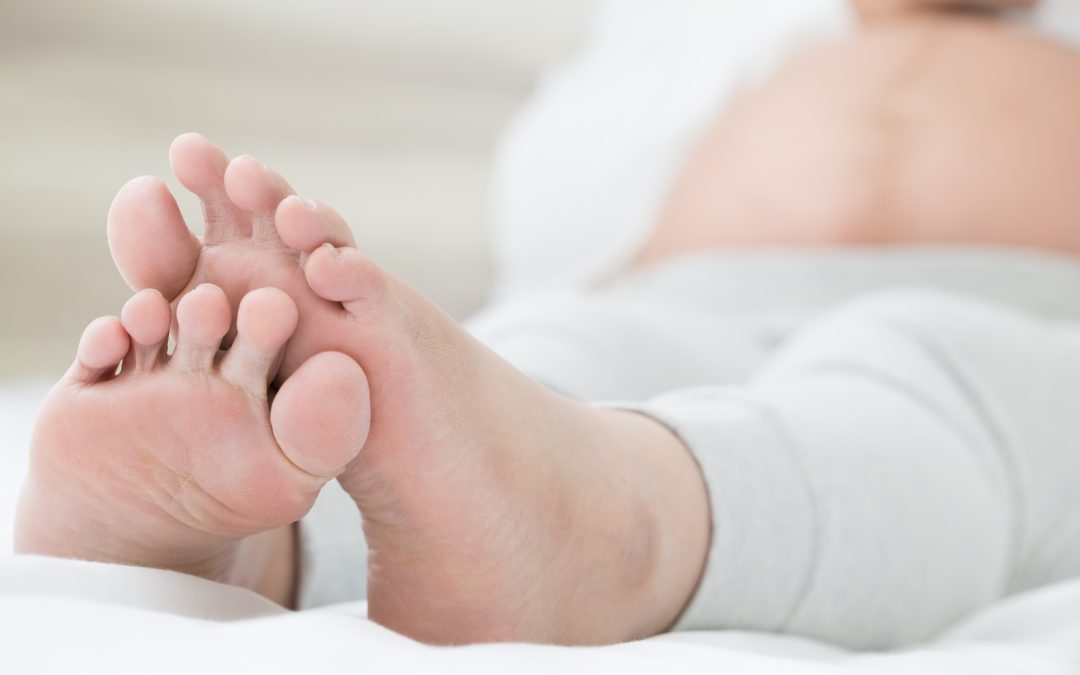
Swelling is a common pregnancy symptom that can make you feel downright miserable. Not only can swelling force you to put aside your favorite pair of shoes until after your little one is born, swelling in your hands, ankles and face can be uncomfortable. The good news is that most swelling during pregnancy is perfectly normal and isn’t a cause for alarm.
What Causes Swelling During Pregnancy?
Edema, or swelling, occurs when your body retains excess fluids in your body tissue. During pregnancy, your body makes approximately 50 percent more blood to provide nutrients and oxygen for your growing baby. These changes in your blood chemistry can cause some of the fluid to shift into your body tissue.
Additionally, in the third trimester, your uterus will have grown to the point that it puts pressure on your pelvic veins and your vena cava, the vein that carries blood from your lower extremities back to your heart. This extra pressure slows the return of blood to the heart, which causes it to pool in the tissues of your feet and ankles. This is why swelling is so common after 20 weeks of pregnancy. Carrying multiples or having excessive amniotic fluid can also increase your risk of swelling.
Things that May Worsen Your Swelling
Sitting or standing for long periods of time will worsen your swelling as it causes circulation to slow and fluids to pool. During the warm summer months, your veins will dilate in an attempt to cool your body. This dilation will cause your swelling to worsen. Eating junk food that is high in sodium and low in potassium can also cause your body to retain more water than normal.
How to Decrease Your Pregnancy Swelling
Though you can’t prevent all pregnancy swelling, there are things you can do to decrease or prevent some of it. These things include:
- Doing low-impact exercises, such as walking, swimming or riding a stationary bike, to get your heart pumping, which will pump the blood more quickly to your heart.
- Drinking plenty of water, which will help your body retain less water. Aim for eight to 10 eight-ounce glasses of water each day. A good way to tell if you’re getting enough water is to look at your urine—it should be pale yellow to clear in color.
- Floating or swimming in a pool deep enough to have water up to your shoulders will help to reduce swelling due to the extra pressure the water puts on your body.
- Refrain from crossing your legs or ankles while sitting.
- If you sit at work, get up at least once an hour to walk around the office. Periodically rolling your ankles and stretching also helps.
- Elevate your feet at home and at work. If you don’t have an ottoman, try placing several pillows on a kitchen chair to make resting your feet more comfortable. If you feel unproductive while relaxing, use the time to prepare for your little one’s arrival by applying for an insurance-provided breast pump or reading up on local pediatrician’s in your area.
- Don’t wear socks with a tight ankle band.
- Wear waist-high compression garments. Putting them on in the morning, before major swelling occurs, can help prevent fluid from pooling in your legs and feet throughout the day.
- Place cold compresses on your ankles or a cool washcloth on your face while you relax at night.
- Get a pregnancy-safe massage to increase circulation.
When to Be Concerned About Your Swelling
Though most swelling isn’t a reason to be alarmed, it can be a symptom of a more serious pregnancy condition called preeclampsia. If your eyes become extremely puffy, your swelling increases severely or is accompanied by a headache, blurred vision or pain in your upper abdomen, call your doctor immediately.
When You Can Expect Your Swelling to Decrease
In the first 24 hours after your baby is born, your swelling will decrease dramatically. In the days that follow, you may notice that you are sweating more or urinating more often than usual—this is your body’s natural way of getting rid of the excess water.
Don’t be alarmed if your ankles are still swollen several days after your baby is born. Put your feet up, drink some water and try to relax. Your body is still recovering from nine months of hard work, but pretty soon, the swelling and puffiness will go away—just in time for pictures of your new little family!


 Complete Our Simple Online Form
Complete Our Simple Online Form We’ll Handle All The Paperwork
We’ll Handle All The Paperwork Receive Your Free Ameda Pump
Receive Your Free Ameda Pump